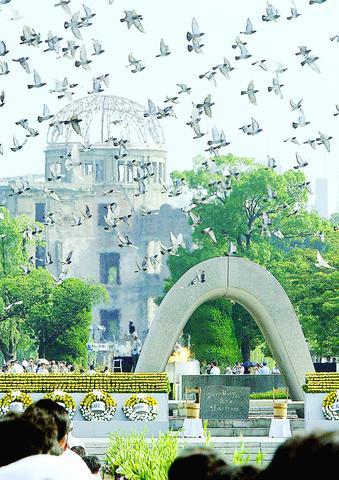Hiroshima's mayor lashed out at the US' nuclear weapons policy yesterday during ceremonies marking the 58th anniversary of the city's atomic bombing, which caused the deaths of over 230,000 people.
Mayor Tadatoshi Akiba said the US worshipped nuclear weapons as "God" and blamed it for jeopardizing the global nuclear non-proliferation regime.

PHOTO: AFP
"The Nuclear Non-Proliferation Treaty, the central international agreement guiding the elimination of nuclear weapons, is on the verge of collapse," Akiba said in an address to some 40,000 people.
"The chief cause is US nuclear policy that, by openly declaring the possibility of a pre-emptive nuclear first strike and calling for resumed research into mini-nukes and other so-called `useable nuclear weapons,' appears to worship nuclear weapons as God," he said.
The mayor also slammed as unjust the US-led war on Iraq, which he blamed for killing innocent civilians. "The weapons of mass destruction that served as the excuse for the war have yet to be found," he said.
Akiba strongly urged US President George W. Bush and North Korean leader Kim Jong-il to personally visit Hiroshima and "confront the reality of nuclear war."
As the clock clicked onto 8:15am, the exact time the US dropped the bomb on Aug. 6, 1945, those at the ceremony at Hiroshima's Peace Memorial Park bowed their heads for a minute's silence in memory of the victims of the attack.
During the 45-minute ceremony, officials added 5,050 names to the register of victims who died immediately or from the after-effects of radiation exposure in the bombing, bringing the total toll to 231,920, an official said.
The Hiroshima bombing was followed by the dropping of a second atomic bomb on the city of Nagasaki on Aug. 9, 1945, which killed another estimated 74,000 people.
Prime Minister Junichiro Koizumi told the service that Japan would stick by its pacifist constitution and its non-nuclear principles because the tragedies of Hiroshima and Nagasaki "can never be repeated."
This year's ceremony came ahead of six-nation talks over North Korea's nuclear weapons development program, which Pyongyang agreed to last week.
Koizumi told reporters after the ceremony that North Korea's abduction of Japanese nationals would be a high priority at the talks.
"At the six-nation talks, obviously, nuclear weapons will be the focus, but for Japan, the abduction issue is just as important," he said.
"We will naturally have close cooperation with the United States and South Korea, but we must make efforts to have China and Russia understand our position as well," he said.
Last week, North Korea said it would accept six-way talks to include North and South Korea, Russia, Japan, China and the US to end the nuclear crisis that began in October last year.
Washington had accused the Stalinist state of reneging on a 1994 bilateral nuclear freeze accord by running a clandestine nuclear program based on enriched uranium.

PRECARIOUS RELATIONS: Commentators in Saudi Arabia accuse the UAE of growing too bold, backing forces at odds with Saudi interests in various conflicts A Saudi Arabian media campaign targeting the United Arab Emirates (UAE) has deepened the Gulf’s worst row in years, stoking fears of a damaging fall-out in the financial heart of the Middle East. Fiery accusations of rights abuses and betrayal have circulated for weeks in state-run and social media after a brief conflict in Yemen, where Saudi airstrikes quelled an offensive by UAE-backed separatists. The United Arab Emirates is “investing in chaos and supporting secessionists” from Libya to Yemen and the Horn of Africa, Saudi Arabia’s al-Ekhbariya TV charged in a report this week. Such invective has been unheard of

US President Donald Trump on Saturday warned Canada that if it concludes a trade deal with China, he would impose a 100 percent tariff on all goods coming over the border. Relations between the US and its northern neighbor have been rocky since Trump returned to the White House a year ago, with spats over trade and Canadian Prime Minister Mark Carney decrying a “rupture” in the US-led global order. During a visit to Beijing earlier this month, Carney hailed a “new strategic partnership” with China that resulted in a “preliminary, but landmark trade agreement” to reduce tariffs — but

Chinese President Xi Jinping’s (習近平) purge of his most senior general is driven by his effort to both secure “total control” of his military and root out corruption, US Ambassador to China David Perdue said told Bloomberg Television yesterday. The probe into Zhang Youxia (張又俠), Xi’s second-in-command, announced over the weekend, is a “major development,” Perdue said, citing the family connections the vice chair of China’s apex military commission has with Xi. Chinese authorities said Zhang was being investigated for suspected serious discipline and law violations, without disclosing further details. “I take him at his word that there’s a corruption effort under

China executed 11 people linked to Myanmar criminal gangs, including “key members” of telecom scam operations, state media reported yesterday, as Beijing toughens its response to the sprawling, transnational industry. Fraud compounds where scammers lure Internet users into fake romantic relationships and cryptocurrency investments have flourished across Southeast Asia, including in Myanmar. Initially largely targeting Chinese speakers, the criminal groups behind the compounds have expanded operations into multiple languages to steal from victims around the world. Those conducting the scams are sometimes willing con artists, and other times trafficked foreign nationals forced to work. In the past few years, Beijing has stepped up cooperation